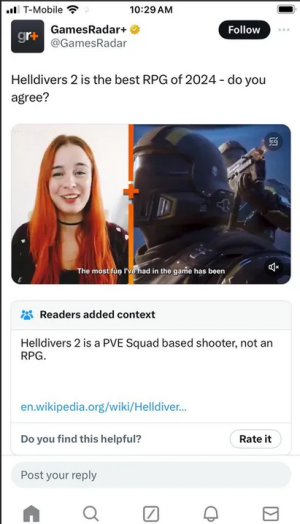Game journalism

Game journalism should disappear -Redditor
The screenshot showcases a fundamental issue in game journalism: a disconnect between reviewers and the actual gameplay experience. The journalist incorrectly categorizes Helldivers 2 as an RPG when it's actually a PVE squad-based shooter. This error, combined with the Reddit comment suggesting the journalist hasn't played the game, highlights why some believe game journalism should be replaced with direct gamer feedback.
Arguments for phasing out traditional game journalism:
- Lack of Expertise: As the example shows, some journalists lack the necessary knowledge or experience with the genres they're reviewing. This can lead to misinformed reviews and inaccurate recommendations.
- Subjectivity and Bias: Reviews are inherently subjective, but journalists may have biases due to relationships with publishers or personal preferences, potentially skewing their opinions.
- Disconnect from Audience: Some journalists might not understand the target audience's expectations or preferences, resulting in reviews that don't resonate with the actual players.
- Rise of User-Generated Content: With platforms like Twitch, YouTube, and social media, gamers can easily share their own experiences and opinions, offering a more authentic and diverse perspective.
The Case for Gamer-Led Reviews:
- Authenticity: Gamers who have actually played the game can provide firsthand accounts of the gameplay, mechanics, and overall experience.
- Diversity: User-generated reviews offer a wider range of perspectives and opinions, catering to different tastes and preferences.
- Transparency: Streamers and YouTubers often showcase raw gameplay footage, allowing viewers to judge the game's quality for themselves.
- Community-Driven: User reviews can spark discussions and debates, fostering a sense of community and shared experience among gamers.
The Way Forward:
While traditional game journalism has its merits, it's clear that user-generated content is becoming increasingly influential in shaping public opinion about games. This doesn't necessarily mean the end of game journalism, but rather a shift towards a more collaborative and community-driven approach.
Journalists can leverage their platform to curate and highlight insightful user reviews, provide in-depth analysis, and offer historical context. Meanwhile, gamers can continue to share their experiences, creating a more vibrant and diverse landscape of game criticism.
Gemini B.S.
Gaming Journalism: Can We Trust the "Experts"? A Look at Helldivers 2 and the Rise of Gamer-Driven Criticism
The gaming world was recently abuzz with controversy when a prominent game journalist mistakenly categorized "Helldivers 2" as an RPG, a far cry from its actual identity as a PVE squad-based shooter. This glaring error, coupled with a Reddit user's assertion that the journalist likely hadn't even played the game, sparked a broader discussion about the state of game journalism and its relevance in today's gaming landscape.
This incident highlights a growing sentiment among gamers: a lack of trust in traditional game journalism. Many feel that reviewers are often out of touch with the gaming community, prioritizing personal biases and relationships with publishers over honest and informed critiques. The rise of user-generated content, such as Twitch streams, YouTube videos, and social media reviews, has further amplified this distrust, as gamers increasingly turn to fellow players for authentic and unbiased opinions.
This shift towards gamer-driven criticism is not without merit. Gamers who have invested time and money into a game are more likely to provide genuine insights into its strengths and weaknesses. Their reviews are often more detailed and passionate, reflecting a deeper understanding of the game's mechanics and nuances.
However, dismissing game journalism entirely would be a mistake. Professional journalists can offer valuable perspectives, such as historical context, industry analysis, and in-depth interviews with developers. They can also play a crucial role in curating and highlighting insightful user-generated content, bridging the gap between the gaming community and the broader public.
The key lies in finding a balance between professional journalism and gamer-driven criticism. Journalists must strive for greater transparency, disclosing any potential conflicts of interest and demonstrating a genuine understanding of the games they review. They should also actively engage with the gaming community, seeking feedback and incorporating diverse perspectives into their work.
By embracing this collaborative approach, we can create a more vibrant and informed gaming discourse, one that celebrates the passion and expertise of both gamers and journalists alike.
Trivia: Did you know that the Society of Professional Journalists (SPJ) Code of Ethics emphasizes the importance of accuracy, fairness, and independence in reporting? This commitment to ethical journalism is crucial for maintaining trust and credibility in the ever-evolving world of gaming news and reviews.
Final words

Game journalism should disappear.


